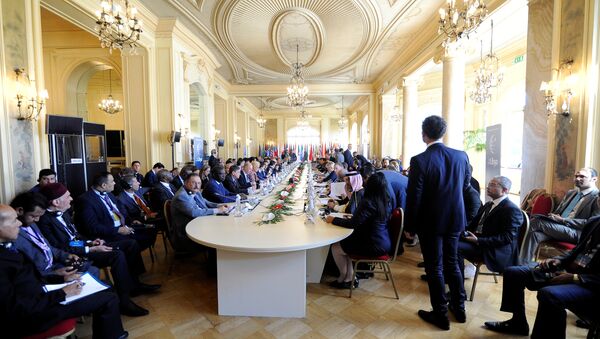Sputnik: None of the European leaders have attended the conference in Palermo in Italy; do you think they are actually committed?
Guma El-Gamaty: I think that the representation of the major Western countries and the major permanent members of the Security Council is low-key, although Russia sent its prime minister and others have sent their foreign ministers, but the American representation is very low-key. I think this reflects that the expectation was somewhat revised and downgraded of what will come out of Palermo. The Italians rushed into this, I think the Italians were locked into a competition with the French and the Italians want to take the initiative away from France and not allow France to impose its own way or its own solutions to resolving of the conflict in Libya. So, now in a way Palermo is a new milestone, a new stop on the way. It replaces what has been agreed in Paris, and I think that the outcome and press releases are not surprising at all, nothing new, nothing major, they are just going along with supporting the UN mission and what it is doing in Libya headed by [UN special envoy for Libya] Ghassan Salamé.
READ MORE: Two-Day Libya Peace Conference Kicking Off in Palermo
Sputnik: Why do you think they are not really giving this much coverage in terms of strategy and importance?
Guma El-Gamaty: The Italian government itself is divided between the Northern League and the Five Stars, two different ideologies, and they have two different emphases and outlooks on how to deal with Libya. It is true that migration is a major issue, especially for Italy. It is also true that terrorism and the threat of al-Qaeda* and Daesh [ISIS/ISIL]* is also a major concern for France and other countries. But what's more important than that is the stability of Libya itself, the divisions that have been going on in Libya, especially over the last four years.
READ MORE: Libya's Haftar is Not Demanding GNA Head's Resignation Before Elections — Source
There are players, regional and international players, who are fueling these divisions and I think that the international community needed to show a clear commitment; they need to come into convergence on an alignment on trying to stabilize Libya, unite Libya, and not prolong this conflict. I think that the international community — Italy and France have their differences, Arab countries are divided on who to support, the US and the UK sometimes show that they are behind Italy and sometimes they take a different stance. So, this division among the international community is not at all helping the situation in Libya, in fact it is prolonging the divisions and the conflict.
*Daesh (ISIS/ISIL/Islamic State), al-Qaeda are terrorist groups banned in Russia.
The views and opinions expressed by the speaker do not necessarily reflect those of Sputnik.


